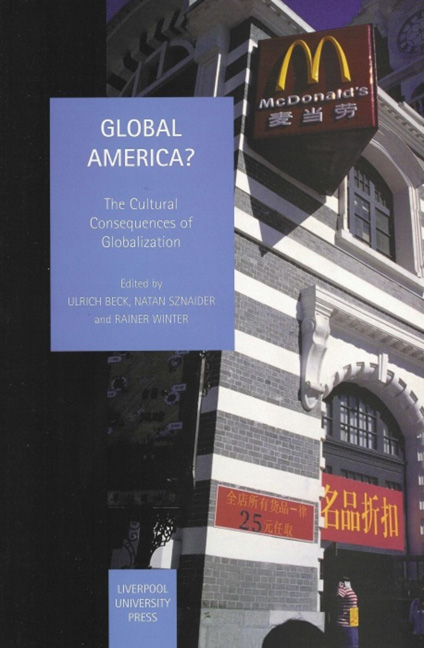Book contents
- Frontmatter
- Contents
- List of Contributors
- Acknowledgments
- Introduction
- PART I THEORETICAL PERSPECTIVES
- PART II NATIONAL CASE STUDIES
- PART III TRANSNATIONAL PROCESSES
- 8 Techno-Migrants in the Network Economy
- 9 The Americanization of Memory: The Case of the Holocaust
- 10 From the Lisbon Disaster to Oprah Winfrey: Suffering as Identity in the Era of Globalization
- 11 Global Media, Cultural Change and the Transformation of the Local: The Contribution of Cultural Studies to a Sociology of Hybrid Formations
- 12 ‘Rockization’: Diversity within Similarity in World Popular Music
- 13 The Internet: An Instrument of Americanization?
- PART IV EPILOGUE
- Rethinking Americanization
8 - Techno-Migrants in the Network Economy
from PART III - TRANSNATIONAL PROCESSES
- Frontmatter
- Contents
- List of Contributors
- Acknowledgments
- Introduction
- PART I THEORETICAL PERSPECTIVES
- PART II NATIONAL CASE STUDIES
- PART III TRANSNATIONAL PROCESSES
- 8 Techno-Migrants in the Network Economy
- 9 The Americanization of Memory: The Case of the Holocaust
- 10 From the Lisbon Disaster to Oprah Winfrey: Suffering as Identity in the Era of Globalization
- 11 Global Media, Cultural Change and the Transformation of the Local: The Contribution of Cultural Studies to a Sociology of Hybrid Formations
- 12 ‘Rockization’: Diversity within Similarity in World Popular Music
- 13 The Internet: An Instrument of Americanization?
- PART IV EPILOGUE
- Rethinking Americanization
Summary
Every autumn, wealthy Chinese resident-aliens of Vancouver leave for Hong Kong, like Canada geese departing for warmer climes. Thousands of Indian techno-migrants employed in Silicon Valley firms also make many trips across the Pacific, some of them to set up high-tech businesses in Bangalore. Less wellheeled migrants – Chinese waiters, Hispanic janitors and Cambodian electronic homeworkers – supply the open labour markets that service the feverish centres of the new economy driving the American West. What can these new mobile figures tell us about citizenship, its cosmopolitan and local dimensions, and the political implications of neo-liberal governance?
‘Liberalism’ is fundamentally concerned with an economy of government. Colin Gordon, paraphrasing Foucault, defines liberalism as a government ‘that economizes on the use of resources and effort to achieve its ends, and more particularly accepts that to govern well is to govern less’ (Gordon 2000: xxiii). It should not be supposed, however, that liberalism means hostility to or the reduction of regulation. On the contrary, liberal initiatives foster conditions for the emergence of a variety of regulatory practices that create markets and particular kinds of modern subjects. In liberal economies, the state relies on a multiplicity of regulatory bodies to shape an objective economic and social reality that is distinct from the state apparatus. The study of sovereignty and citizenship in liberal formations thus requires us to shift from the level of political institutions to the study of government as a set of practices of regulation and normalization (Foucault 2000). In recent decades, neo-liberalism, an ethos that would permit no barrier to market forces, has spread unevenly across the world as market criteria come to shape regulatory processes that directly affect the meaning and practice of citizenship.
I have thus explored citizenship not simply as a juridical status, but as rationalities of government that have conditioned the flexible strategies of managerial migrants who seek residence and opportunity in different countries (Ong 1999). I also argued that neo-liberal policies introduced in South-East Asia have transformed political sovereignty, bringing about new social spaces that are defined by different rationalities of disciplining or caring (Ong 2000). In this chapter, my attention shifts to the implications of the new migrant flows and new landscapes of governmentality in North America.
- Type
- Chapter
- Information
- Global America?The Cultural Consequences of Globalization, pp. 153 - 173Publisher: Liverpool University PressPrint publication year: 2003



